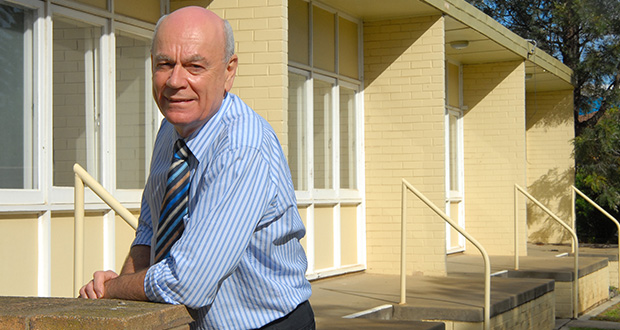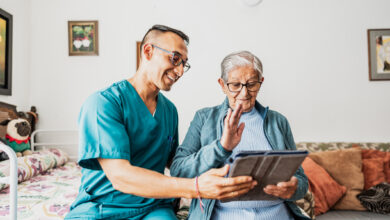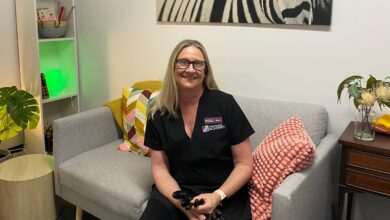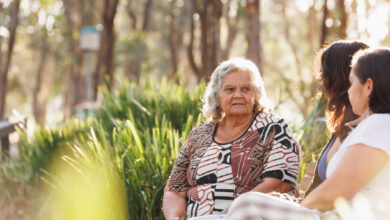The modern elder customer journey – opinion

It's standard fare for profitable businesses to know a lot about their customer's journey. And the pain points on the journey.
Then make sure their products and services address the pain points, becoming value their customers can't do without.
So, why does this recipe for success collapse when businesses and aged care providers develop products and services for their older customers?
A pretty significant market segment of some 4 million older Australians, and rapidly growing.
We asked them.
Businesses and providers told us there's little to learn about the "retirement and aged care journey."
That it's all about staying independent, filling the day, getting care, and keeping the family happy … and that's what their products do.
We were curious about how older people saw their lives, so we asked them.
First, we discovered they do think of this time as a journey, with every day to be savoured … perhaps more so than any previous life stage.
They told us it's a journey with very significant pain points to be navigated.
And that they feel alone in facing this.
We discovered that "loss" was a key linking thread through these pain points.
The loss of jobs; roles; skills; learning; purpose; relevance; drivers-licence; mobility; savings; income; home; independence; health; physical functioning; friends; networks; reputation; … and pretty well everything if you have to move into residential care.
They also told us about the pain of not being able to seize the considerable opportunities of this life stage.
To enjoy flexibility; to indulge in guilt-free fun; to learn and grow; to explore new-found pursuits; to volunteer and work; to develop new roles, and nurture others, including grandchildren.
They enthused about taking up new sports; strengthening social ties; joining community associations; setting up enterprises; and getting active on social issues.
All this started to paint a very different journey to the "retirement and aged care journey" businesses and providers had told us about.
More like one with a delightful array of "hard to access" opportunity points, but dominated by a mind-bending array of "hard to avoid" loss points.
Older people told us the impact of these unaddressed pain points accumulates and becomes very damaging. And that this is what "ageing" has become.
They told us that often there was little or no product or service available to help them get over the accumulated losses and get on with their lives.
And, even worse, the well-established aged care products that did address some of the losses came with mandated additional losses.
Not exactly a "buyers-market"! Which sent us back to see what we could learn from businesses' love of the customer journey.
It seems that "mapping" the customer journey has become an essential tool for business success.
Businesses begin with a number of personas, each with a range of scenarios, to ensure maps don't become too generic and miss out on opportunities for new customer insights and questions.
Businesses never stop mapping, with 80 per cent of leaders saying their customers are changing faster than they can change their businesses.
Success for businesses is how relevant they can be to their customers, including the customers' experience with the company itself.
So, what would it take to get relevant products and services for older people?
This is a question of what drives relevance and potency when the consumers of the service are not customers who can walk away.
And where providers don't go broke from providing bad service.
We've tried individualised budgets; government-mandated standards; needs assessment; person-centred care; subsidising community leadership and effort; provider competition; constructing a market; client rights; consumer engagement; and a Royal Commission … to little avail.
So, instead, we asked some "modern elder champions" what they thought it would take for older people to get relevant products and services:
Chip Conley said they offer older people training in successful life transitions.
Joanne Earl said to include "career" and learning plans in older peoples' retirement planning.
Lynette Nixon said to deliver digital literacy training and support to all older people.
Julianne Parkinson said to use "living laboratories" to co-realise what can be expected from this life stage, then co-design whatever delivers that.
Joe Coughlin said to engage with longevity start-ups who develop products to solve problems.
John Spoehr said to share iterative innovations to re-imagine and learn about what works.
Stephen Johnson said to create an alternative "learning" peak-body for providers who address modern elder pain points.
Dan Buettner said to construct communities that nudge older people towards good habits.
John McKnight said success only comes when businesses, aged care providers and freely given community associations work well together.
Wolf Wolfensberger said managers need to have lived experience with the products and services they offer.
Ian Henschke said to publicise the new narrative of the "modern elder journey" drawn out of the life experiences of the 20 per cent older Australian who've already done it.
Marlene Krasovitsky said to stop thinking of older people as somehow less than the rest of us.
Kay Patterson says to strengthen the protection of the human rights of older persons.
We liked this list for teaching us that aligning several transformative strategies is the way to get relevant products and services to modern elders.
We liked this list for its vision of modern elders, not just as engaged customers but also as citizens and masters of their lives.
But older people told us that in the first half of the "modern elder journey", it's hard to be a customer. And in the second half, it's hard to be a citizen.
This means we're all going to be needed in shifting the "retirement and aged care journey" to the "modern elder journey".
With the promise of significant impact and profit for those who make the change.
And for those who don't?
Their meagre impact and profit will be entirely the result of holding onto the prejudice that older people are only ever "consumers" of whatever we dish up to them.
Email: [email protected]





